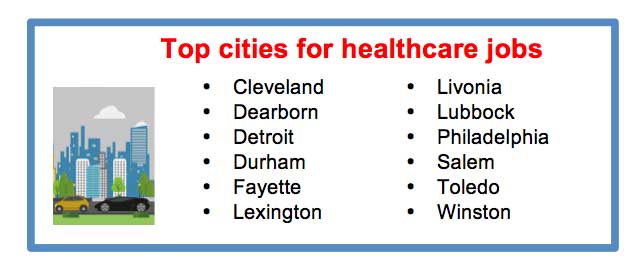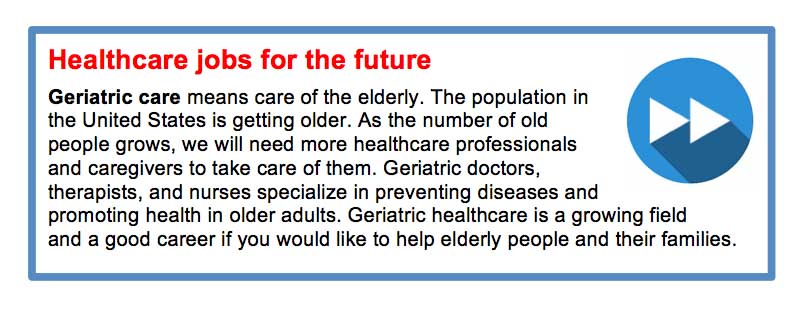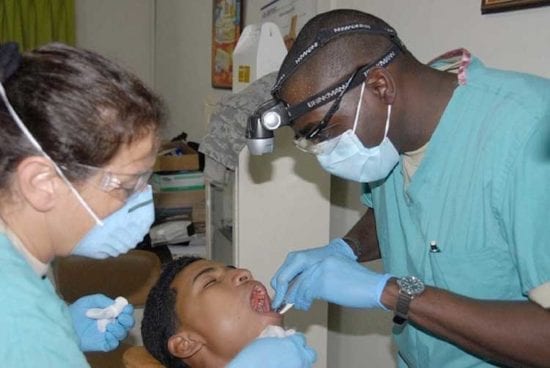Healthcare is a billion-dollar industry with millions of employees. Trained healthcare workers are in high demand. Immigrants and refugees have a good chance of finding a healthcare job at a hospital because these large workplaces often serve diverse populations. Hospitals often look for multilingual people, so your language skills will be a help.
Which healthcare job?
Healthcare jobs can be well-paid and fulfilling. With the right training, you can find a stable job with many opportunities to advance in your career. There are many different types of healthcare jobs. Here are some of them:
- Nursing assistant – A Certified Nursing Assistant (CNA) is someone who helps a registered or licensed nurse with obtaining vital signs, organizing medical equipment, administering sponge baths, and more. In order to become certified, you will need to complete training to get certified. Each state has its own rules, but it’s usually about 75 hours of classroom instructions and clinical training. After your training and passing an exam, you will be certified to work.
- Phlebotomist – Phlebotomists draw blood for donations, transfusions, tests, and research. They must understand how blood drawing equipment operates. They do not have to spend a long time in school to get a certification. Phlebotomy training takes 4 to 8 months.
- Home health aide – A home health aide is in charge of helping people with disabilities, older adults, or sick patients with day-to-day tasks such as bathing, dressing, and housekeeping. A home aide may travel between several patients or live with a patient full-time. To become a certified home health aide, you must complete 75 hours of training, demonstrate your skills, and pass an examination.
- Dental assistant – Dental assistants do administrative duties and basic patient care in a dental office. For example, a dental assistant may prepare a patient for oral cleaning or he may be in charge of filling out and organizing patients records for the office. Training can take anywhere from nine months to two years to complete, depending on whether it’s a certificate, diploma or degree. Find out how to become a registered dental assistant.
- Massage therapist – A massage therapist is a person who uses touch to manipulate muscles in the body. This can relieve tension, stress, and pain and allows the patients to relax. You need a license to be a massage therapist. Legal minimum hours for obtaining a massage therapy license vary by state, and these minimums range from 330 to 1,000 hours.
- Physician – Physician means doctor. Physicians diagnose and treat patients. Many of them work in hospitals, but they may also operate their own practices. Physicians can work in many specialties, including pediatrics, family care, oncology, and intensive care. To become a physician, students are required to complete four years of undergraduate college four years of medical school followed by three to eight years of residency training.
- Health information technician – A health information technician (HIT) keeps medical records safe, accurate, and up to date. Almost all these records are kept on computers. Most people working in health information technology hold an associate’s degree in health information technology or a related field. Find out how to become a health information technician.
- Pharmacy technician – Pharmacy technicians help pharmacists assist patients. They must understand drug names and uses. Pharmacy techs know how to dispense medications and determine the correct dosage, but they do not prescribe or make decisions about medications. Pharmacy technicians need a certificate. Certificate and associate degree programs can take one to two years to complete.
- Registered nurse (RN) – Registered nurses take care of patients in hospitals and clinics. You can become an RN by getting an associate’s degree, bachelor’s degree or a diploma through a hospital program. Then you must take and pass the national council licensure examination. Some schools offer online nursing degrees.
- Radiologic technologist – Radiologic technologists perform exams using imaging, such as X-rays and CT scans. They work alongside radiologists, but they are not trained to diagnose the results of the imaging exams they perform. An associate degree to become a radiologist technician can take up to two years.

Is healthcare the right job for me?
As you saw above, training for many healthcare jobs can take a long time. While healthcare jobs are rewarding and often well-paying, healthcare professional often deal with a lot of stress, time commitments, and responsibility. It’s important to think about these things if you wish to make healthcare your long-term career. You can also read 6 things to consider before choosing a health career or take the health career test for students and adults.
If your career requires you to get an associate’s degree or bachelor’s degree, you should think about whether you are willing to invest a lot of time and money in your education. There are a lot of opportunities for you to advance in the health career. You might consider getting a shorter-term certification now and moving up to the next level later in your career. For example, you can start as CNA and work your way up to become a RN.
Where do I start?
If you are not sure what career most interests you, think about areas of the healthcare industry that will grow in the future. For example, technology and older adult care are growing areas. Whatever field you choose, you will probably need training, certification, or both.

Training and skills
If you know what healthcare career you are interested in, look at the job requirements for that career. Depending on the requirements, you can attend community college or technical school, go to four-year university, or study online.
- If you haven’t received your high school diploma, that should be your first step. Our free GED® preparation program will help you to get a high school credential.
- Community colleges and technical schools offer two-year degrees and training for all kinds of healthcare careers. You can find a community college near you.
- Job Corps is a government program that offers free education and vocational training to young men and women ages 16 to 24. Job Corps training includes healthcare jobs such as: CNA, dental assistant, pharmacy technician, medical administrative assistant, health unit coordinator, and licensed/vocational nurse.
- You can read about how to apply for college.
What if I am already qualified in another country?
If you have healthcare qualification or degree, Upwardly Global helps work-authorized immigrants, refugees, asylees, and Special Immigrant Visa holders (SIVs) restart their professional careers in the United States.
What else do I need?
- Do you need to learn English?
- Do you want to become a citizen?
- Do you want to earn your GED® diploma?

USAHello classes are free and are made for refugees and immigrants. Prepare for your GED® test or to become a US citizen.
Start your job search
Here some ways to start your job search:
- Use your local employment center
Government employment centers in every city are free. They offer advice and keep a list of local jobs. They help with resumes and job applications. They can connect you to healthcare job training and education. Find your nearest employment center.
- Look online
HealthCareers is one of several websites that lists healthcare jobs online.
- Check the websites of healthcare organizations
Look online at the websites of places in your community that you would like to work.
We aim to offer easy to understand information that is updated regularly. This information is not legal advice.


